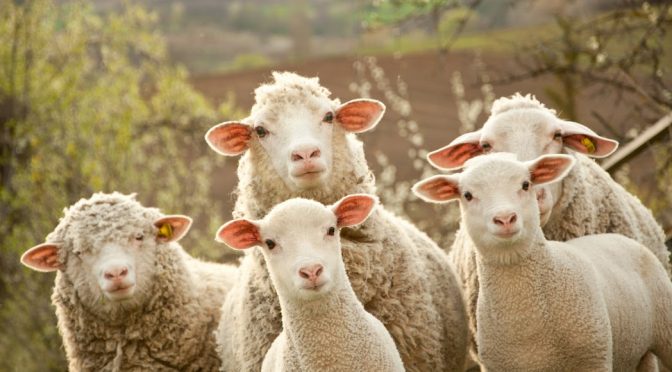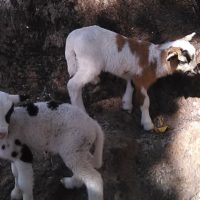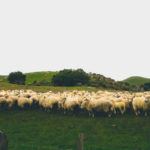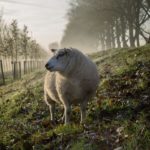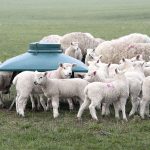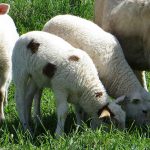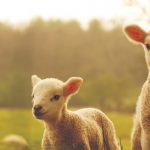How Many Sheep Would It Take To Make A Living?
Reprinted:
June 20th, 2008 ·
DONALD J. BREECE PH.D., FARM MANAGEMENT SPECIALIST, OSU EXTENSION CENTER-LIMA
(Originally Published in Sheep Team Newsletter February 2005)
The size of a ewe flock, or number of feeder lambs, required to make a desired living income is one of those economic questions most easily answered by “that depends.” It depends upon such things as the: desired family living standard, amount of debt or investment to be paid by enterprise profits, production efficiency, market prices received for the products, and per unit cost of production. The web sites listed at the end of this article provide various budgets and analysis methods to help establish the profit potential of a given sheep enterprise. It should be noted that Net Farm Income or Profit will be affected greatly by assumptions made for market prices, production levels (lambs sold per ewe), available family labor, and feed costs. However, it may be best to first step back and look at some general economic principles, as it pertains to all family farm businesses producing commodities for sale.
The majority of farm flocks are 25 to 50 ewes and act as “scavengers” on a small farm utilizing waste land for pasture, unused labor and non-farm income. According to Rodney Jones, Kansas State Extension Livestock Production Economist, 250 or more ewes are a more efficient enterprise because farms can justify more labor saving equipment. However, this size will still not provide enough work nor income for a farm family.
The 2003 Ohio Business Summary of farms, utilizing the FINPACK computer program for financial analysis, averaged $333,344 Value of Farm Production per farm with 1.5 operators, $66,233 Net Farm Income, and about $20,000 of non-farm income. On a per family basis this would be $222,000 of Farm Production, $44,155 NFI, plus about $14,000 of non-farm income. Economists have generally indicated that it takes about $42-48,000 living costs for an average farm family. The average family living and taxes from the 2003 Ohio Summary was $46,752 per farm. So how many dollars of gross farm sales would it generally take to earn nearly $50,000 to take care of a family?
It generally takes about $300,000 of gross revenue to generate $50,000 family living income. Assume it takes 74% of revenue (operating expense ratio) to cover “out-of-the -pocket” costs. This leaves 26% for debt service, capital replacement, growth and family living costs. The $300,000 gross revenue example would net $78,000. After $50,000 for family living, this would only leave $28,000 for debt payments and investment.
How many sheep would produce $300,000 in gross revenue? If you were efficient enough to sell 1.5, 125 pound lambs per ewe at a $90/cwt, the gross per ewe (not including wool or cull income) is $168.75. Therefore, it would take 1778 ewes if the farm held to a 74% operating expense ratio. In other words, a net of $43.88 per ewe would be left for debt payments, investment and family living. Now look at the following web sites, insert your numbers and determine your own budget. Also, note that you will need to grow 5-7% per year just to keep even.
Cornell University budgets for sheep, including a 700 ewe example: http://www.sheep.cornell.edu/sheep/management/economics/cspsoftware/budget/index.html
Idaho Extension budget for 100 Ewes and Lambs: http://www.ag.uidaho.edu/aers/PDF/Livestock/EBB-SF1-02_Budget.pdf
Iowa State Extension inter-active livestock budgets: http://www.extension.iastate.edu/agdm/livestock/html/b1-21.html
Kansas State University budget for Ewe Flocks: http://www.oznet.ksu.edu/library/agec2/mf421.pdf
Kansas State University budget for Feedlot Lambs: http://www.oznet.ksu.edu/library/agec2/mf634.pdf
Midwest Plans Service for sheep facilities and equipment: http://www.mwpshq.org/
Ohio State University Extension budgets: http://aede.osu.edu/People/Moore.301//index.htm
Virginia Extension Sheep & Lamb budgets: http://www.ext.vt.edu/departments/agecon/spreadsheets/livestock/sheep.html

